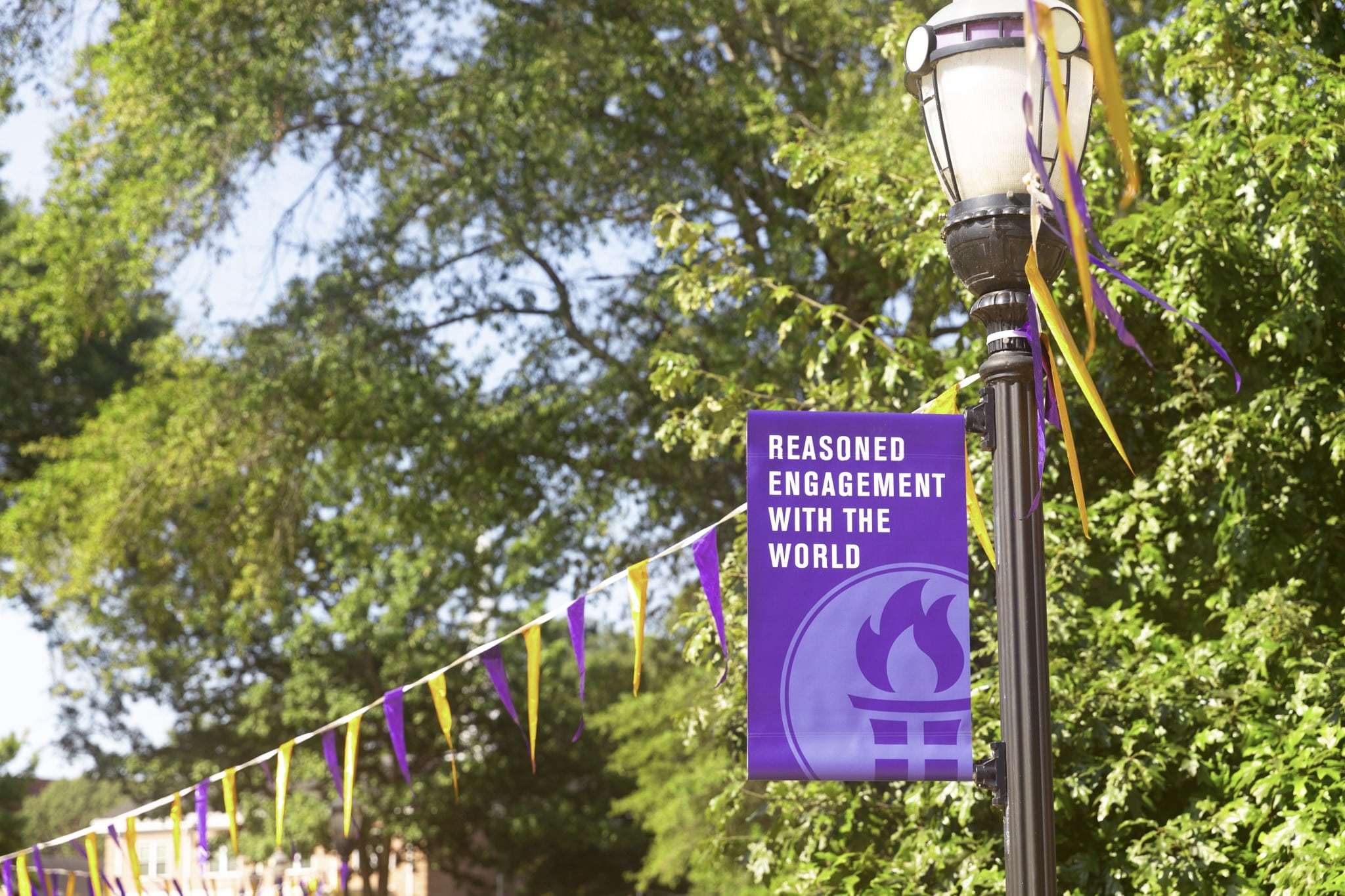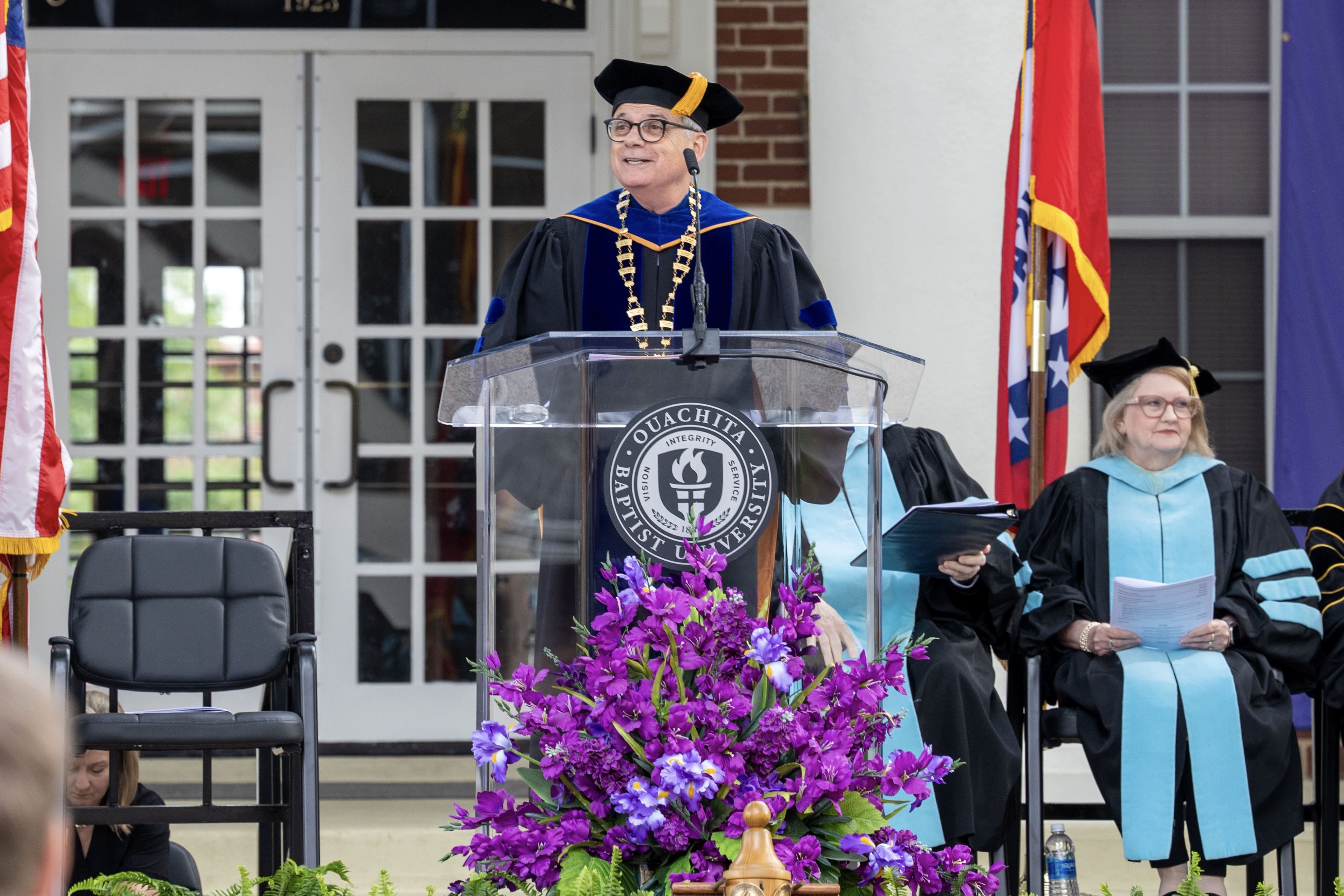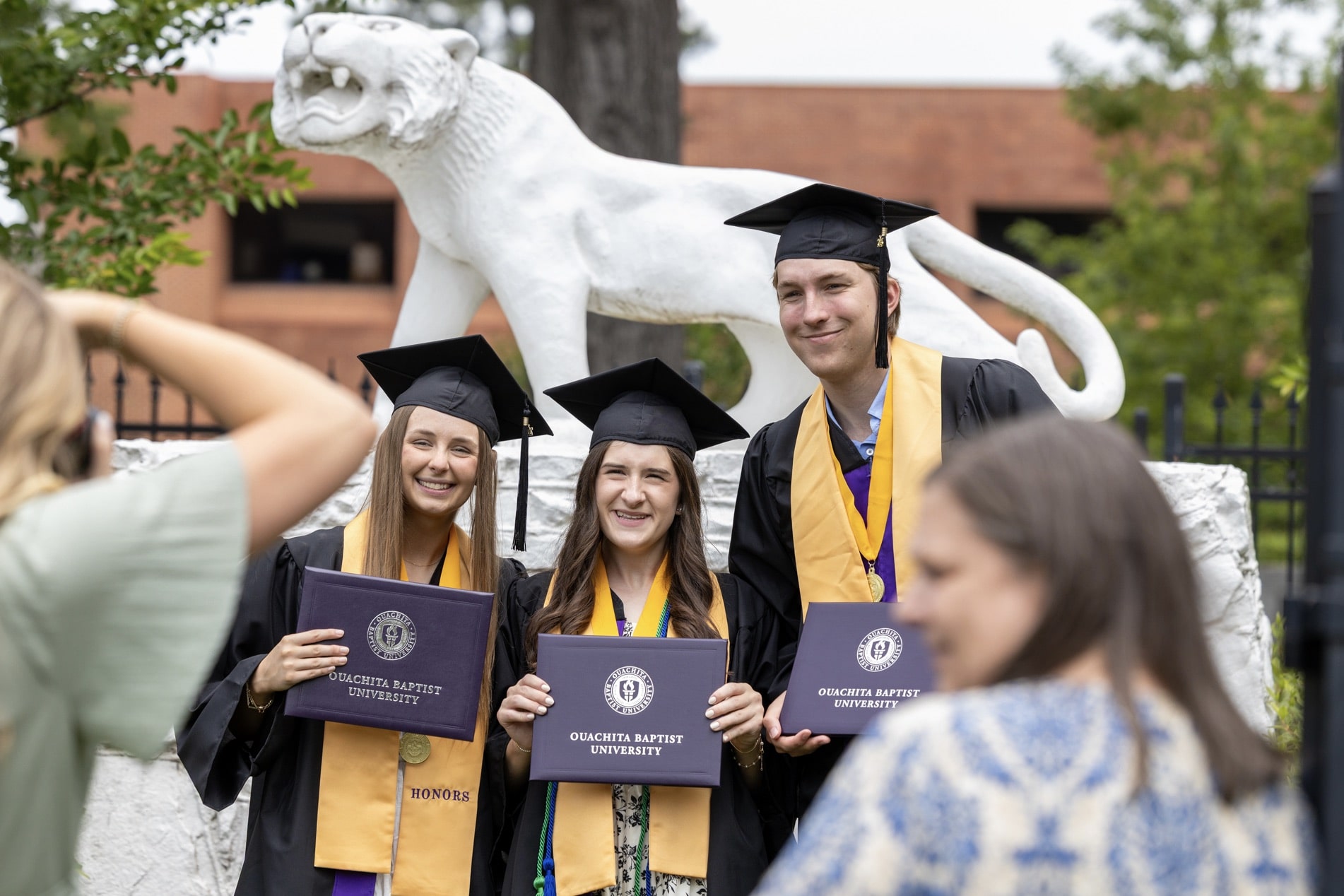news
 May 10, 2019
- Ben R. Sells
May 10, 2019
- Ben R. Sells
Focus on graduates, not speakers
 May 10, 2019
- Ben R. Sells
May 10, 2019
- Ben R. Sells
Editorial Note: The following article originally appeared as guest article in the Arkansas-Democrat Gazette on May 5, 2019. See the original here.
I love the pomp and circumstance that marks commencement. It's the most important, picture-perfect day in the life of a university. And as a president, it's a great honor to present a diploma, shake hands and congratulate each graduate.
The tradition of commencement, one that spans hundreds of years, has a modern addition: the high-profile speaker. It's an approach I once supported. But my mind changed after becoming president of Ouachita Baptist University in 2016. I learned Ouachita's practice was not having an outside commencement speaker. It's a practice I've come to deeply affirm.
Here's why.
When justifying the prominent speaker, universities often claim that it will make graduation more memorable for students. Yet I know invitations are also given for other reasons such as to outshine competitors, grab media headlines, curry favor with an influencer, impress alumni or cultivate a philanthropic gift. These are understandable motivations. But is commencement the right moment for any of them?
A college commencement is an important milestone in the lives of students and their families. Students have worked diligently over four years for this day. Their families have often made a significant financial investment. Graduates deserve their moment. Ouachita's practice allows the spotlight to be on the students and the fulfillment of their quest, not on an outside speaker who, no matter how impressive, knows little about their journeys.
We also believe it's a time to express thanks to faculty, staff and coaches for the quality and character of their selfless service. Their efforts are instrumental in students' successes. They also help explain the university's favorable graduation and placement rates. And for Ouachita, commencement is a time to reflect on the Arkansas Baptists who 133 years ago brought us to this forested bluff overlooking the Ouachita River.
All of this -- celebrating students, thanking colleagues, appreciating history -- can become obscured, even if it's unintentional, by the recruitment and accommodation of a guest speaker. Sometimes, guest speakers use the occasion to hold forth on their journey or their interests rather than the path to be charted by the new graduates. Sometimes, a speaker can create conflict on the very day a university should be most unified in celebrating the accomplishments of students. And usually, they simply speak too long.
Instead of allocating this singular moment and precious time to an outside speaker, Ouachita seeks to personalize this poignant moment for our graduates and their loved ones. We believe this focus makes a Ouachita commencement especially meaningful. Like others, we cite the achievements of the class and thank family members. We also recognize pastors and veterans, and open and close the ceremony with prayers of dedication.
Most importantly, we limit the speaking to keep the ceremony short. This puts the emphasis on students. As president, I provide about 10 minutes of remarks. It's a great honor and deep privilege to address our graduates for the last time as students and for the first time as alumni. Commencement is an opportunity to remind graduates of what brought them here, what defined their time here and what it means to have Ouachita as their alma mater.
As a university, we share pride in what they've accomplished. We commit to cheer for them in all their successes, pray for them in their setbacks, and challenge them to achieve their God-given potential. We will always welcome them back to their college home.
Colleges and universities have differing objectives and priorities. At this time of the year, news stories about commencement often lead with the name of the guest speaker. My intention is to provide insight as to why one institution has chosen a different way when it comes to commencement speakers. Given the current skepticism about higher education, we should rightly review any and all activities where the pursuit of institutional prestige may have eclipsed the highest and best interests of the students.
No, the Ouachita way isn't the only way, but I've come to believe it's a better way for our university.
By Dr. Ben Sells, Ouachita President
May 10, 2019
I love the pomp and circumstance that marks commencement. It's the most important, picture-perfect day in the life of a university. And as a president, it's a great honor to present a diploma, shake hands and congratulate each graduate.
The tradition of commencement, one that spans hundreds of years, has a modern addition: the high-profile speaker. It's an approach I once supported. But my mind changed after becoming president of Ouachita Baptist University in 2016. I learned Ouachita's practice was not having an outside commencement speaker. It's a practice I've come to deeply affirm.
Here's why.
When justifying the prominent speaker, universities often claim that it will make graduation more memorable for students. Yet I know invitations are also given for other reasons such as to outshine competitors, grab media headlines, curry favor with an influencer, impress alumni or cultivate a philanthropic gift. These are understandable motivations. But is commencement the right moment for any of them?
A college commencement is an important milestone in the lives of students and their families. Students have worked diligently over four years for this day. Their families have often made a significant financial investment. Graduates deserve their moment. Ouachita's practice allows the spotlight to be on the students and the fulfillment of their quest, not on an outside speaker who, no matter how impressive, knows little about their journeys.
We also believe it's a time to express thanks to faculty, staff and coaches for the quality and character of their selfless service. Their efforts are instrumental in students' successes. They also help explain the university's favorable graduation and placement rates. And for Ouachita, commencement is a time to reflect on the Arkansas Baptists who 133 years ago brought us to this forested bluff overlooking the Ouachita River.
All of this -- celebrating students, thanking colleagues, appreciating history -- can become obscured, even if it's unintentional, by the recruitment and accommodation of a guest speaker. Sometimes, guest speakers use the occasion to hold forth on their journey or their interests rather than the path to be charted by the new graduates. Sometimes, a speaker can create conflict on the very day a university should be most unified in celebrating the accomplishments of students. And usually, they simply speak too long.
Instead of allocating this singular moment and precious time to an outside speaker, Ouachita seeks to personalize this poignant moment for our graduates and their loved ones. We believe this focus makes a Ouachita commencement especially meaningful. Like others, we cite the achievements of the class and thank family members. We also recognize pastors and veterans, and open and close the ceremony with prayers of dedication.
Most importantly, we limit the speaking to keep the ceremony short. This puts the emphasis on students. As president, I provide about 10 minutes of remarks. It's a great honor and deep privilege to address our graduates for the last time as students and for the first time as alumni. Commencement is an opportunity to remind graduates of what brought them here, what defined their time here and what it means to have Ouachita as their alma mater.
As a university, we share pride in what they've accomplished. We commit to cheer for them in all their successes, pray for them in their setbacks, and challenge them to achieve their God-given potential. We will always welcome them back to their college home.
Colleges and universities have differing objectives and priorities. At this time of the year, news stories about commencement often lead with the name of the guest speaker. My intention is to provide insight as to why one institution has chosen a different way when it comes to commencement speakers. Given the current skepticism about higher education, we should rightly review any and all activities where the pursuit of institutional prestige may have eclipsed the highest and best interests of the students.
No, the Ouachita way isn't the only way, but I've come to believe it's a better way for our university.
By Dr. Ben Sells, Ouachita President
May 10, 2019
- Tags:
- Commencement
- President
You Also Might Like
Recent
news
Ouachita reports Spring '26 enrollment, led by 50% increase in graduate students
February 11, 2026






